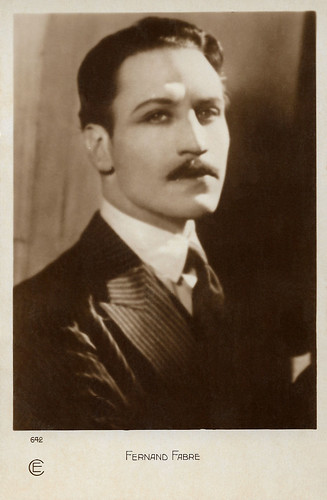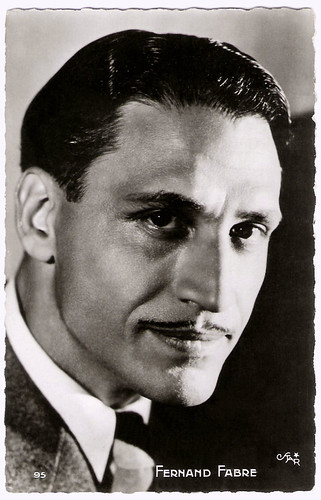
French postcard by A.N., Paris, no. 764. Photo: Studio Rudolph.

French postcard by A.N., Paris, no. 440. Photo: Engberg. Fernand Fabre as the Count de la Motte in Le collier de la reine/The Queen's Necklace (Tony Lekain, Gaston Ravel, 1929).
A manipulative country doctor who creates his own circle of patients
Fernand Louis Adelin Fabre was born in 1899 in Salon-de-Provence, Bouches-du-Rhône, France.
In the early 1920s he acted at the Théâtre de l'Odéon in 'Les Misérables' (1921), based on Victor Hugo's classic novel, and Molière (1922).
From the mid-1920s he alternated stage performances with screen Roles. He made his film debut as the title character in the French silent film Knock, ou le Triomphe de la médecine (René Hervil, 1925), based on Jules Romains' play (1923/24). It's about a manipulative country doctor who creates his own circle of patients, thereby beating his competitor. The exteriors were shot in Uzerche, Corrèze. Louis Jouvet, who played the doctor in the stage version, later on also acted in a sound film version (1933).
From 1927 Fabre had a steady career in French cinema. First he appeared in the late silent films Miss Helyett (Maurice Kéroul, Georges Monca, 1928) with Marie Glory, Minuit... place Pigalle (René Hervil, 1928) with Nicolas Rimsky and Renée Heribel, L'appassionata (André Liabel, Léon Mathot, 1929) with Mathot and Heribel, La femme du voisin (Jacques de Baroncelli, 1929) with Dolly Davis, Le permis d'aimer (Georges Pallu, 1929) with Desdemona Mazza, and Paris' Girls (Henry Roussel, 1929) with Suzy Vernon.
He also appeared with Marcelle Chantal and Diana Karenne in the historical drama Le collier de la reine/The Queen's Necklace (Gaston Ravel, Tony Lekain, 1929), a part-talkie without spoken dialogue.The film is an adaptation of Alexandre Dumas's novel 'The Queen's Necklace' which portrays the Affair of the Diamond Necklace which occurred before the French Revolution.

Belgian postcard by S.A. Cacao et Chocolat Kivou, Vilvoorde / N.V. Cacao en Chocolade Kivou, Vilvoorde. Photo: Paramount.

French postcard by Cinémagazine-Edition, no. 642.
A never-do-well husband, who after years of abusing his wife, disappears with their son
In 1930 Fernand Fabre starred in his first all-talkie, Toute sa vie (Alberto Cavalcanti, 1930), produced at the Paris Paramount studios, and co-starring Marcelle Chantal. It was the French language version of Dorothy Arzner's Sarah and Son (1930), about a "ne'er-do-well husband, who after years of abusing his wife, disappears with their son, and winds up selling him to a wealthy family. Years later, the wife - now a world-famous opera singer - finally has enough time and money to begin a search for him." (IMDb)
All through the 1930s, Fabre had male leads or major supporting parts in French sound films such as the Alexandre Dumas fils adaptation L'étrangère (Gaston Ravel, 1931) with Elvire Popesco, Le réquisitoire/The Indictment (Dimitri Buchowetzki, 1931) with Marcelle Chantal, the Colette adaptation La vagabonde (Solange Térac, 1932), the comedy thriller On a volé un homme/A Man Has Been Stolen (Max Ophüls, 1934), Barcarolle (Gerhard Lamprecht, Roger Le Bon, 1935), La mystérieuse lady/The Mysterious Lady (Robert Péguy, 1936), Nuits de princes/Nights of Princes (Vladimir Strizhevsky, 1938), Les nouveaux riches (André Berthomieu, 1938), plus several minor parts in films.
During the war he acted in only two films, L'escalier sans fin/The Stairs Without End (Georges Lacombe, 1943) with Pierre Fresnay, and Le colonel Chabert/Colonel Chabert (René Le Hénaff, 1943) with Raimu.
After the war, Fernand Fabre had major supporting parts in crime and espionnage films such as Dernier metro/The Last Metro (Maurice de Canonge, 1945), Le cabaret du grand large (René Jayet, 1946) with Sessue Hayakawa, and L'homme de la nuit (Jayet, 1946), but also the Jean-Paul Sartre adaptation Les jeux sont faits/The Chips are Down, (Jean Delannoy, 1947) with Micheline Presle, the comedy Le crime du Bouif (André Cerf, 1952), and the Jacques Brel drama Franz (1972) with Brel himself in the lead.
from the mid-1950s, Fabre also acted in French TV movies and series, such as the series En votre âme et conscience (1956-1959), Roberto Rossellini's TV movie La prise de pouvoir par Louis XIV (1966), and two episodes of Les enquêtes du commissaire Maigret. While on stage Fabre had acted several times in Somerset Maugham's 'Adorable Julia' (in 1954, 1962, and 1972), he also acted in a TV version of it in 1972.
Fernand Fabre was married three times: to Marguerite Guerrau (divorced), the actress Mona Goya (1935, divorced in 1944), and Reine Fages. He died in Paris in 1987, at the age of 87.

French postcard by A.N., Paris, no. 617. Photo: Paramount.
 French postcard, no. 95. Photo: Star.
French postcard, no. 95. Photo: Star.Sources: Cinememorial.com, Wikipedia (French and English), and IMDb.
No comments:
Post a Comment